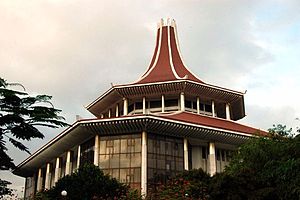(July 11 2009) Sri Lanka is failing to provide concrete proof of the death of Velupillai Prabakaran, the leader of the Liberation Tigers of Tamil Ealam (LTTE) and Pottu Amman, the intelligence chief of the outfit who are wanted by India to wind up the case regarding the assassination of the former Prime Minister Rajiv Gandhi.
The sources say that Sri Lankan authorities are unable to provide scientific proof for the deaths of these Tiger leaders. Although a corpse said to be of Prabakaran's was displayed as the government declared he was killed on May 18. No corpse of Pottu Amman's was shown so far.
The situation has triggered claims from the ardent Tamil Ealam nationalists that their elusive leader is still alive and will appear in public in right moment. The admittance of the expatriate leadership of the LTTE has also gone unhindered among these arch nationalists.
In theater-crazy Tamil Nadu, the politicians are manipulating the mystery for their gains where the Chief Minister M Karunanidhi told the State Assembly of a story of a “hero's escape on a horseback with none in the know of his whereabouts” inferred here to mean LTTE leader V Prabhakaran.
“Mr Prabhakaran had been announced as dead in the past too atleast four times in 1984, 1987, 1989 and in 2004. This is the fifth time the announcement has come. Similarly four wars of independence have been fought in Sri Lanka. The fifth war for independence for Eelam (the area of Tamils in Sri Lanka) will commence and our respected Mr Prabhakaran will lead that war,”said Tamil Nadu politician P. Nedumaran, close associate of the elusive LTTE leader who has known him for decades.
“In connection with the Rajiv Gandhi assassination case, a formal request for an official confirmation of the deaths of Prabhakaran and Pottu Amman, the chief of the intelligence wing of the LTTE (Liberation Tigers of Tamil Eelam), has been made to the government of Sri Lanka,” External Affairs Minister S.M. Krishna told parliament, when asked whether India had sought the death certificate of Prabhakaran.


![Reblog this post [with Zemanta]](http://img.zemanta.com/reblog_e.png?x-id=3622031e-73dc-4ce7-b03d-a70f44cffb9f)

![Reblog this post [with Zemanta]](http://img.zemanta.com/reblog_e.png?x-id=53b635c4-2eee-4f78-973d-5ec9554e4687)



